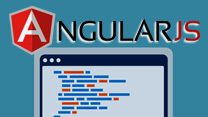AngularJS is an open source JavaScript framework that lets you create amazing Ajax-based web apps. Generally, the complexity involved in building large-scale and complex Ajax apps is tremendous. AngularJS aims to minimize this complexity by offering a great environment for development, as well as the means to test your apps.
The two-way data binding is probably the coolest and most useful feature in AngularJS. Put simply, data binding is automatic synchronization of data between your view (HTML) and model (simple JavaScript variables).
In AngularJS we create templates and bind different components with specific models. So, whenever the model value changes, the view is automatically updated, and whenever the value of any view component changes (e.g the value of input text) the bound model is also updated. In other words you can carry out operations on the model, change their values, and AngularJS guarantees that the view will be updated to reflect the changes.
By using AngularJS, you're going to build solid, well-structured, and fully testable apps in no time. This not only saves you from maintenance nightmares, but makes your (and your Project Manager's) life much easier.
Lastly, Single Page Apps (SPAs) are everywhere nowadays. With the advent of HTML5 and its related APIs, we don't want to redirect our users to a new page every time they click on something. Instead, we want to load the content asynchronously on the same page and just change the URL in the browser to reflect it.
This class will not only explain all the basic componets of the AngularJS framework in each lesson, but also guide students through creating your own real-word web application step-by-step. This class only covers AngularJS 1.x.
Objectives for this class are:
- Understand how a SPA (Single Page Application) works.
- What are the components of a MVC (Module View Controller) application.
- How a MVW (Module View Whatever) differs from MVC.
- Understand the basic components of an AngularJS application: binding, code structure, routing, templating, directives, factories, services and testing.
- Improve your JavaScripting code skills by using refined object oriented techniques.
- Learn how to develop complex web applications.
Applicable Job Roles: Front-end web developer, web developer, software engineer, programmer

